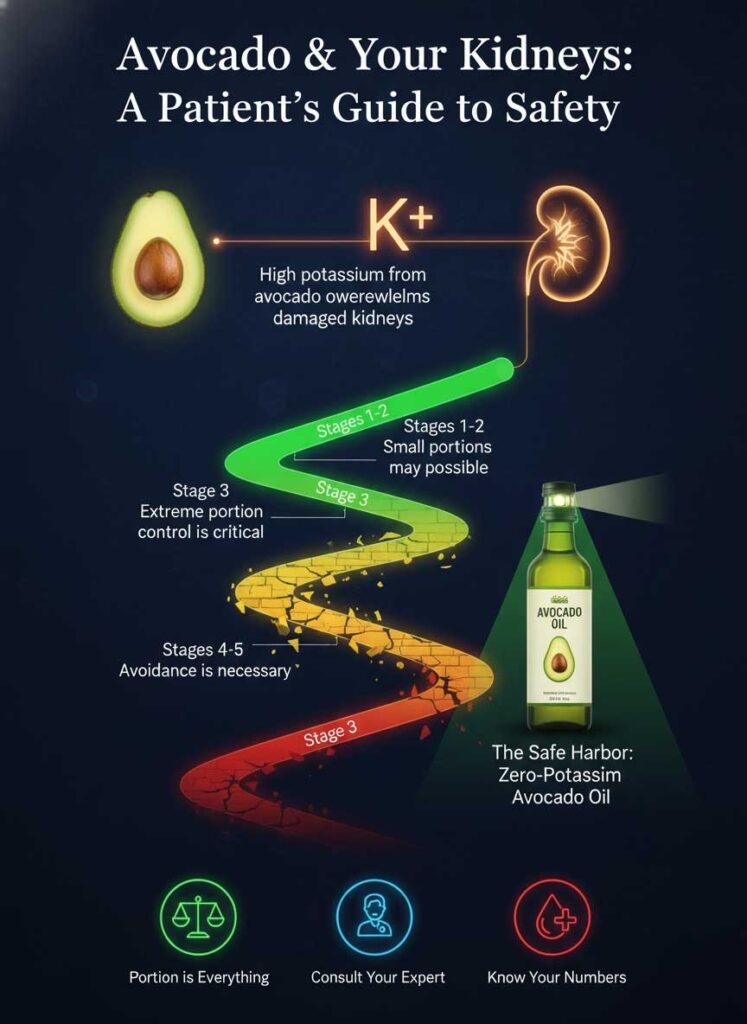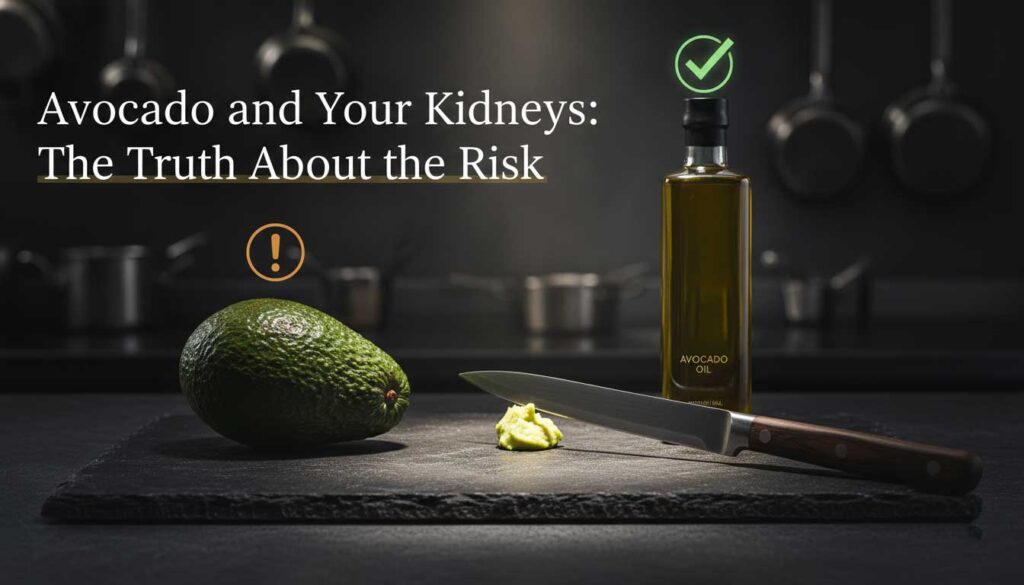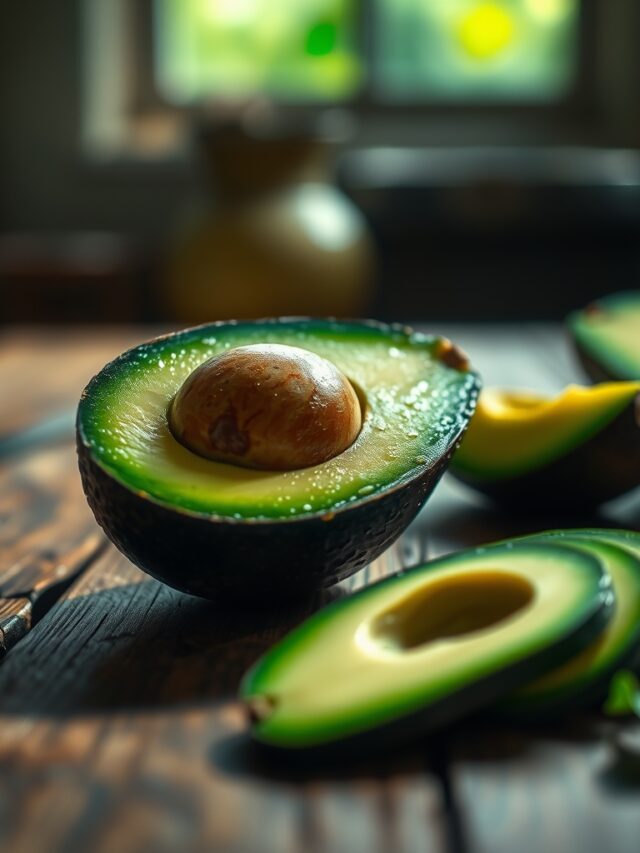It’s a scene that plays out in grocery stores across America every day. You see a perfect, ripe avocado, and your mind instantly goes to creamy guacamole, vibrant salads, or a slice of satisfying toast. But if you are one of the 37 million adults in the USA living with chronic kidney disease (CKD), that simple choice is filled with anxiety and confusion. This celebrated superfood, praised by health experts, carries a warning label that only kidney patients can see. You are left asking a critical question: are avocados bad for your kidneys?
Table of Contents
The answer is not a straightforward yes or no. The relationship between avocados and chronic kidney disease is complex, and navigating it safely requires more than just a quick search. It depends entirely on the stage of your kidney disease, your recent blood work, and, most importantly, your understanding of portion control. This definitive guide will walk you through the essential facts, providing clear, stage-specific advice based on the latest science in kidney nutrition. We will break down the risks, explore safe alternatives, and empower you to build a diet that protects your health without sacrificing all the foods you enjoy.

The Core Conflict: Why a “Superfood” Poses a Risk for Kidney Health
At the heart of the avocado debate for kidney patients is a single, essential mineral: potassium. Understanding its role is the first step in creating a safe and effective chronic kidney disease diet plan.
Understanding Potassium and the Dangers of Hyperkalemia in CKD
Potassium is a vital electrolyte that your body needs to function correctly. It helps regulate nerve signals, enables muscle contractions, and keeps your heartbeat steady and regular. In a healthy body, the kidneys act as master filters, efficiently removing any excess potassium from your blood and excreting it through urine to maintain a perfect balance.

However, when you have CKD, your kidneys slowly lose this filtering ability. As kidney function declines, they can no longer remove potassium effectively. This allows the mineral to build up in your bloodstream, leading to a serious and potentially life-threatening condition called hyperkalemia. Effective potassium management in CKD is therefore not just a dietary suggestion; it is a medical necessity.
When potassium levels rise too high, it can cause:
- Muscle weakness and fatigue.
- Numbness or tingling sensations.
- Nausea and vomiting.
- An irregular heartbeat (arrhythmia) and palpitations.
- In severe cases, sudden cardiac arrest.

The connection between avocado potassium and kidney health is direct. Consuming high potassium foods can quickly elevate blood levels to a dangerous range for someone with compromised kidneys, making the careful selection of kidney-friendly foods a critical daily task.
An Avocado’s Nutritional Profile: A Double-Edged Sword
The reason avocados are at the center of this conversation is their incredibly dense nutritional profile. While they are packed with heart-healthy monounsaturated fats, fiber, and vitamins, they are also exceptionally high in potassium. This combination of benefits and risks is what creates so much confusion for the avocado consumption of kidney patients.
Let’s look at the numbers directly. The data shows just how quickly the potassium can add up, turning a healthy snack for most into a significant risk for those with CKD.
| Avocado Serving Size | Approximate Potassium (mg) | Approximate Phosphorus (mg) | Key Benefit |
| One Whole Avocado (~200g) | 975 mg | 104 mg | High in Heart-Healthy Fats |
| Half an Avocado (~100g) | 488 mg | 52 mg | Good Source of Fiber |
| One-Quarter Avocado (~50g) | 244 mg | 26 mg | Nutrient-Dense |
| One Tablespoon (~15g) | 73 mg | 8 mg | Controlled Flavor Addition |
For context, many patients in the later stages of CKD are advised to limit their total daily potassium intake to around 2,000 mg. As you can see from the table, just half an avocado could wipe out nearly a quarter of that entire day’s allowance, making the avocado diet for CKD stages a matter of careful calculation.
The Definitive Avocado Diet Guide for Every CKD Stage
So, can people with CKD eat avocados safely at different stages? The answer lies in personalized, stage-specific dietary recommendations. Your kidney function, measured by your glomerular filtration rate (GFR), and your blood potassium levels will determine what is safe for you. Always consult your nephrologist and a registered renal dietitian before making changes to your diet.

Early-Stage CKD (Stages 1-2): A Cautious Green Light
In stages 1 and 2 of CKD, your GFR is still above 60, meaning your kidneys retain a significant amount of their filtering capacity. At this point, a strict potassium restriction is typically not necessary unless your blood tests show elevated levels.
For most individuals in these early stages, a small, controlled portion of avocado can be safely included in the diet. A serving size of one-quarter of a medium avocado (approximately 244 mg of potassium) two or three times per week is often considered acceptable. The focus here is on a balanced, heart-healthy eating pattern, such as the DASH diet, which is often recommended by the National Kidney Foundation to help preserve kidney function. These stage-wise CKD dietary recommendations prioritize overall health over the complete elimination of single foods.

Moderate-Stage CKD (Stage 3): The Turning Point for Potassium Management
Stage 3 CKD (GFR of 30-59) is where dietary management becomes much more critical. Your kidneys are now significantly impaired, and the risk of hyperkalemia rises. This is the stage where your doctor or dietitian will likely introduce a specific daily potassium limit.
The latest dietary guidelines for avocados in CKD stage 3 and beyond emphasize aggressive portion control. A safe serving of avocado might shrink to just one or two tablespoons (about 73-146 mg of potassium). This small amount must be carefully tracked and budgeted within your daily potassium allowance. The conversation shifts from “if” you can eat avocado to “how” you can make it fit without exceeding your limits. This is where understanding the connection between avocado potassium and kidney health becomes a practical, daily skill.

Late-Stage CKD & Dialysis (Stages 4-5): Why Avoidance is the Safest Bet
In late-stage CKD (GFR below 30) and for patients on dialysis, the kidneys have very little to no ability to filter potassium. The risk of life-threatening hyperkalemia is constant and severe, making the avocado diet for CKD stages 4 and 5 extremely restrictive.
So, what is the recommended avocado serving size for dialysis patients? For the vast majority of patients, the safest recommendation is zero. While dialysis treatments do remove potassium from the blood, levels can climb to dangerous heights between sessions. The high potassium load from even a small amount of avocado is simply too risky. A single serving could lead to complications requiring emergency medical care. The focus for a dialysis patient’s diet must be on foods that are naturally low in potassium to ensure safety. The avocado benefits and risks for kidneys are clear at this stage; the risk far outweighs any potential benefit.

Avocado Oil vs. Whole Avocado: A Safer Way to Get the Benefits?
For those who miss the rich flavor and heart-healthy fats of avocado, there is an excellent and safe alternative. Understanding the difference between the whole fruit and its oil is key to expanding your renal diet avocado intake options without the risk.

Why Avocado Oil is a Kidney-Friendly Alternative
Avocado oil is a fantastic choice for kidney patients because it contains all the beneficial monounsaturated fats without any of the dangerous potassium. During the extraction process, the oil is separated from the fruit’s pulp and water. Since potassium is a water-soluble mineral, it gets left behind with the pulp.
This makes pure avocado oil a zero-potassium food. You can use it freely for cooking, sautéing, or creating salad dressings and marinades. It allows you to incorporate a key component of the avocado flavor and its cardiovascular benefits into your kidney-friendly foods list without worrying about hyperkalemia.
Emerging Research: Does Avocado Oil Benefit Kidney Function?
The benefits might go even further. While research is still in its early phases and primarily based on animal studies, some scientific findings suggest that the antioxidant compounds in avocado oil could be beneficial. Preliminary studies have explored if avocado oil benefits kidney function by helping to improve mitochondrial health and reduce oxidative stress, which are factors that can contribute to kidney damage, especially in cases related to hypertension.
It is crucial to understand that this research does not suggest avocado oil is a treatment for kidney disease. However, it does reinforce its status as a healthy, safe fat source for those on a renal diet.
Comparison Table: Choosing the Right Avocado Product for Your Renal Diet
This table breaks down the choice between whole avocado and avocado oil, making it clear which is the right option for a kidney-conscious diet.
| Feature | Whole Avocado (1/4 Fruit) | Avocado Oil (1 Tbsp) | The Verdict for Kidney Patients |
| Potassium Content | High (~244 mg) | 0 mg | Oil is the clear winner. |
| Phosphorus Content | Moderate (~26 mg) | 0 mg | Oil is safer. |
| Healthy Fats | Excellent Source | Excellent Source | Both are good, but oil is the safer way to get them. |
| Fiber | Good Source (~3.4g) | 0g | Whole avocado has fiber, but the risk is too high for many. |
| Overall Kidney Safety | High Risk; Use with Extreme Caution | Generally Safe | Choose avocado oil for peace of mind. |
Special Considerations and Related Health Questions
The journey with kidney disease is unique for everyone. Certain situations, like receiving a transplant or adopting a new dietary lifestyle, bring up specific questions about avocado consumption for kidney patients.
Avocados for Kidney Transplant Recipients: Navigating a New Diet
So, are avocados good or bad for kidney transplant recipients? After a successful kidney transplant, your new, healthy kidney can filter potassium effectively again. However, the situation is more complex than it seems. Many anti-rejection medications, such as Tacrolimus or Cyclosporine, can have side effects that raise blood potassium levels.
Therefore, your diet may remain restrictive in the first few months after surgery. As your condition stabilizes, your transplant team and dietitian will guide you on how to safely reintroduce higher-potassium foods like avocado. Monitoring your blood work will be key to determining how much you can tolerate.
The Kidney Stone Question: Can Avocado Help or Hurt?
This is a common point of confusion. For individuals with healthy kidneys who are prone to certain types of kidney stones (calcium oxalate stones), a potassium-rich diet can be beneficial. Potassium binds with calcium in the urine, preventing the formation of stone-forming crystals.
However, for anyone with CKD, this potential benefit is completely overshadowed by the immediate and severe danger of hyperkalemia. The dietary advice for preventing kidney stones is very different from the diet required to manage kidney failure. If you have CKD, you must prioritize potassium restriction over any other dietary goal.
Incorporating Avocado into a Plant-Based CKD Diet
There is growing evidence that a carefully managed plant-based diet for CKD can offer significant health benefits, including slowing disease progression. However, this approach requires expert planning because many plant-based staples are naturally high in potassium and phosphorus.

Foods like beans, lentils, nuts, seeds, and potatoes are all central to many plant-based diets, but they are also on the caution list for CKD. Attempting to add a high-potassium food like avocado into this mix without professional guidance is risky. A renal dietitian specializing in plant-based nutrition can help you create a meal plan that is balanced, safe, and meets all your medical needs.
Summary & Key Takeaways: A Final Verdict on Avocados and Kidney Health
The safety of avocado consumption for kidney patients is a highly personalized issue, not a one-size-fits-all rule. The core takeaway is that the extreme potassium content of avocados poses a significant risk of hyperkalemia, a dangerous condition for anyone with compromised kidney function, especially those in CKD stages 3 through 5.

For most individuals with moderate to advanced kidney disease, the risks associated with eating whole avocado far outweigh the nutritional benefits. The safest and most effective way to enjoy the heart-healthy fats associated with this fruit is by using avocado oil, which is completely free of potassium.
Your kidney health journey is unique. Always consult with your nephrologist and a registered renal dietitian. They can analyze your lab results and help you design a chronic kidney disease diet plan that is safe, effective, and tailored specifically to you.
Frequently Asked Questions (FAQs)
Are avocados safe for people with kidney disease?
Avocados are only safe in very small, dietitian-approved portions for individuals in the early stages of kidney disease with normal blood potassium. For those in later stages (3-5) or on dialysis, they are generally considered unsafe due to their high potassium content.
How much avocado can a CKD patient eat daily?
This is highly dependent on the CKD stage. In early stages, one-quarter of an avocado a few times a week may be acceptable. For late-stage CKD, the daily recommended amount is almost always zero to prevent dangerous potassium buildup.
Can eating avocados cause hyperkalemia in kidney patients?
Yes, absolutely. Because avocados are so rich in potassium, eating them is a direct cause of high blood potassium (hyperkalemia) in patients whose kidneys are too damaged to filter it out.
What is the potassium content of an avocado?
A single medium-sized avocado can contain over 900 mg of potassium. Even a small quarter-avocado serving contains around 244 mg, which is a significant amount for a potassium-restricted diet.
Is avocado oil better than whole avocado for kidney disease patients?
Yes, avocado oil is a far superior and safer choice. The oil contains the fruit’s healthy monounsaturated fats but has zero potassium, making it an excellent kidney-friendly option for cooking and salad dressings.
Should dialysis patients limit avocado in their diet?
Yes. Dialysis patients must follow the strictest renal diet and should completely avoid or severely limit avocado. The risk of developing life-threatening hyperkalemia between dialysis sessions is extremely high.
How do I balance avocado with other high-potassium foods in a CKD diet?
If your dietitian approves a very small amount of avocado, you must meticulously eliminate all other high-potassium foods from that meal. This includes items like potatoes, tomatoes, bananas, and beans. It requires careful tracking of your daily intake.
What are the latest dietary guidelines for avocados in CKD?
Emerging guidelines continue to move away from a “do not eat” list toward a personalized approach based on an individual’s lab values. For avocados in CKD Stage 3 and beyond, this means a focus on strict portion control and potassium tracking under the guidance of a renal dietitian.
Can avocado help prevent kidney stones if I have CKD?
No. While potassium can help prevent certain kidney stones in people with healthy kidneys, this benefit is irrelevant for CKD patients. The risk of hyperkalemia from high potassium intake is a much more immediate and serious danger.
Is guacamole bad for your kidneys?
Yes, for most kidney patients, guacamole is considered bad for the kidneys. Its primary ingredient is avocado, making it extremely high in potassium. Additionally, it often contains other high-potassium ingredients like tomatoes.
Does avocado affect phosphorus levels in CKD?
Avocados do contain phosphorus, another mineral that must be limited in a renal diet. However, the phosphorus from plant sources (like avocado) is less easily absorbed than phosphorus from animal products or additives. The primary and most urgent concern with avocados remains their very high potassium content.









